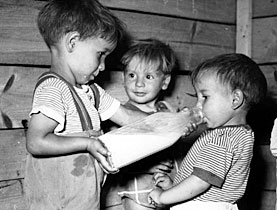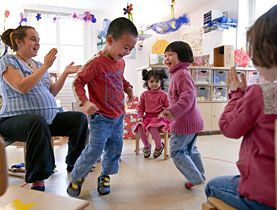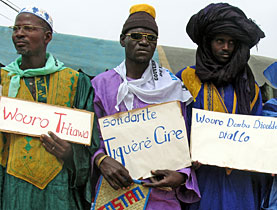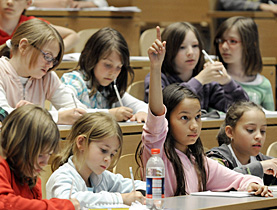Marking 50 years of protecting children

Unicef Switzerland has made a name for itself in recent years through its campaigns on children's rights and on stopping female genital mutilation.
But as its director Elsbeth Müller tells swissinfo.ch, these are just some of the successes it has counted during its 50 years in existence – a milestone which is being celebrated on Monday.
Unicef Switzerland – one of 36 national Unicef committees worldwide – was set up by former parliamentarian Hans Conzett. It raises funds for both international and national projects.
The organisation is marking its anniversary with a gala in Zurich, where it has its headquarters. Around 600 people, young and old, are expected to attend the event, which is being held just after World Children’s Day.
swissinfo.ch: How did Unicef Switzerland come to be set up?
Elsbeth Müller: Unicef was established as a children’s organisation after the Second World War because the United Nations realised that children were suffering, especially in eastern Europe, Italy and Greece. The UN then decided to extend the mandate to children throughout the world. Unicef created the national committees to ensure it could receive additional money to set up programmes and to link itself to civil society in the contributing countries.
The first Swiss fundraising campaign in 1959 was the “Milchspende” where people were asked to donate the equivalent to the price of a cup of milk for a child in India. They raised around SFr1.9million ($1.86 million), which was a huge amount for that time.
swissinfo.ch: How has Unicef Switzerland’s mandate changed over the years?
E.M.: The most important change was in 1989 when the UN Convention on the Rights of the Child came into force. Switzerland was late in ratifying it in 1997. But already before that, in the early 90s, Unicef Switzerland started working for children in Switzerland as well.
One of the main campaigns was advocating for children who were not allowed to stay in Switzerland because their fathers were seasonal workers. Some children were living in hiding. This campaign not only showed that every single child should be counted and have access to the convention’s rights, but also that there should be no discrimination based on status or origin. With this campaign, Unicef Switzerland started to involve itself in children’s rights in Switzerland and since then it has become a voice for these rights and for pointing out issues that need action.
swissinfo.ch: One of your most high profile campaigns has been against female genital mutilation.
E.M.: Female genital mutilation is increasingly interlinked with migration groups, as people coming from countries where it is practiced normally bring their values with them. This means not only do we have to set up programmes in the countries of origin, but we also have to advocate for programmes in Switzerland. Of course it’s not up to us to set up these programmes: that’s the government’s job because these girls have to be protected as part of the convention. What we can do is show the importance of protecting girls against female genital mutilation happening in Switzerland or during their holidays abroad. We want all forms of the practice outlawed under the same law.
swissinfo.ch: What is your vision for the next few years?
E.M.: For me, it’s clear that the fulfilment of UN Convention on the Rights of the Child is a key element. Children are the future and the future lies in our hands. If we don’t ensure that every child has access to the rights agreed by the UN and the member states, society will not develop.
swissinfo.ch: Is this realistic? There is still so much to do in the domain of children’s rights.
E.M.: You know, we have always to keep in mind that goals have to be set high. We need to strengthen all capacities and to work closely together to ensure that everyone takes responsibility for society and their children. Unicef can convene these partners together and work to ensure that society values children. It can do its utmost to support governments and partner organisations to help children and then it’s up to society.
swissinfo.ch: You have been at Unicef for 13 years now, what has been your personal highlight during this time?
E.M.: I was very touched by a little girl I met after the genocide in Rwanda. Her name was Maria, she was eight, and she was the head of her household. She was telling me that she lost her little sister because she didn’t go to the doctor in time and she was suffering terribly. It really touches you when you see a little child heading a household, not because she was asked to but because the situation in Rwanda was so difficult after the genocide.
Then I asked her what her dream was and she told me that she wanted to be Rwanda’s beauty queen and then I realised that this was the same for Swiss children. The only real difference between a Rwandan and Swiss girl is that they are born into completely different worlds. We should not abandon the rights of these little Marias because they need us to fulfil their rights, that’s our obligation. This really touched me and has had a sustainable impact on my everyday work.
Isobel Leybold-Johnson in Zurich, swissinfo.ch
1946: After World War II, European children faced famine and disease. Unicef was created in December by the United Nations to provide food, clothing and health care to them.
1953: Unicef becomes a permanent part of the UN.
1959: The UN General Assembly adopts the Declaration of the Rights of the Child, which defines children’s rights to protection, education, health care, shelter and good nutrition.
Unicef Switzerland is founded by Hans Conzett, who remains committee president until 1988.
1965: Unicef is awarded the 1965 Nobel Peace Prize “for the promotion of brotherhood among nations.”
1989: The Convention on the Rights of the Child is adopted by the UN General Assembly. It enters into force in September 1990. It becomes the most widely- and rapidly-accepted human rights treaty in history
Since it was founded in 1959, the organisation has supported programmes and projects in around 80 countries. The key topics have been survival, health, education, nutrition, water and sanitation and protection.
It has collected almost SFr778 million ($754 million) from the Swiss population in 50 years of which around SFr281 million comes from sales of greetings cards and presents and SFr497 million from donation campaigns. Unicef Switzerland has sold around 150 million greetings so far. Currently its income is around SFr30 million a year.
Its main goal is to raise funds for its mother organisation Unicef for international projects and also to ensure that Unicef has a worldwide presence and is the main advocate for children throughout the world. The Swiss and other national branches have a certain measure of independence and can raise issues that affect children in industrialized countries.

In compliance with the JTI standards
More: SWI swissinfo.ch certified by the Journalism Trust Initiative




You can find an overview of ongoing debates with our journalists here . Please join us!
If you want to start a conversation about a topic raised in this article or want to report factual errors, email us at english@swissinfo.ch.